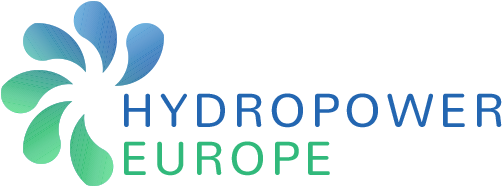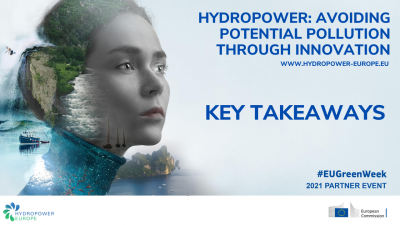Press Releases
HYDROPOWER EUROPE hosted a Partner Event about potential pollution in hydropower during the EU Green Week 2021
On the 8th of June 2021, over 70 of the almost 100 registered attendees joined the experts in a roundtable discussion on the topic “Hydropower: how to avoid potential pollution sources and to mitigate environmental impacts by innovative measures and concepts” to shed light on good practice that should serve as the basic standard for hydropower deployment.
HYDROPOWER EUROPE organised a Partner Event at the EU Green Week 2021 under the theme of Zero Pollution to highlight good practice and approaches which help to avoid terrestrial and aquatic pollution and help to mitigate harmful impacts. By sharing the interdisciplinary experience, the experts discussed the challenges regarding potential pollution including environmental as well as social-economic impacts.
Mark Morris from HYDROPOWER EUROPE set the scene with a presentation Hydropower: from pollution to impact. The keynote speech was delivered by Claire Descourtieux, Head of the Environment Department at the EDF Hydro Engineering Centre who presented concrete examples of how to manage potential sources of pollution and potential environmental impacts during the life cycle of a hydropower plant. The presentation is available here (after the registration).
The roundtable discussion, facilitated by the project coordinator Anton Schleiss, honorary president of ICOLD and professor emeritus at EPFL, was centralised around the topic of how innovation can eliminate and/or reduce the sources of pollution and impacts. Short statements from the experts listed below served as triggering inputs for the discussion:
- Thomas Schleker Policy Officer, DG Research and Innovation
- Besfort Kosova Researcher & Project Manager, Balkan Green Foundation
- Gundula Konrad Senior Expert in Regulatory Affairs for Hydropower, VERBUND
- Raffaele Guerini EERA’s Joint Programme Hydropower Manager
- Ole G. Dahlhaug Acting Coordinator of EERA’s Joint Programme Hydropower
- Peter Stettner ETIP Smart Networks for Energy Transition
- Peter Rutschmann FIT Hydro, Technical University of Munich
- Helmut Habersack University of Natural Resources and Life Sciences
The outcomes provided a rich source of ideas and suggestions for the HYDROPOWER EUROPE Forum to consider whilst finalising their main documents, which comprise the Research and Innovation Agenda and Strategic Industry Roadmap for hydropower in Europe.
Roundtable discussion findings
Hydro as a support to the energy system
The role of hydro should be to provide support to the energy system rather than as a mass supplier. New projects are required in many countries to mitigate climate change impacts. Today, large projects are performed according to the highest standards as was also shown by Claire Descourtieux in her keynote presentation.
Hydro is perceived as without pollution
Hydro is perceived without pollution but with environmental impacts. Due to a lack of awareness, hydro is perceived as ‘established’, ‘old tech’, not something that is alive, innovating and evolving. Even though advanced techniques and innovative designs are often implemented in new hydropower projects, the results and success stories of these new projects are not communicated enough. For instance, ecological design is implemented in green field or refurbishing projects, to properly anticipate the potential environmental and social impacts early in the project design stage, avoid or minimize them and, when necessary, compensate them. Circularity and sustainability have been implemented thanks to refined methodologies (Strategic Environment Assessment, UN Guides, CBI’s criteria, EU taxonomy, HSAP, IHA protocol, ESG tools,…) including lifetime cycle analyses.
Law and regulation enforcement is needed
In the Balkans, a mixture of a failure with law and regulation enforcement with the cause of the damage is reported for hydro. In many countries, small hydropower projects don’t need rigorous environmental impact assessments and the limit for such is often set at 10 MW which represents projects which already have a high potential impact. The limit for implementing environmental impact assessments should be much lower - for example, at 3 MW or even 1 MW if there is significant flow diversion. This should be a standard set for and demanded by all EU member countries (i.e. also when supporting renewable energy development in countries like the Balkans).
R&I on impact issues
Even though there seem to be a lot of R&I actions focusing on impact issues with hydro, it is unclear how effective these solutions are nor how aware of these solutions people are. Only R&I which finds its way into practice is successful. R&I solutions arise best from cross-disciplinary interaction. Amongst other solutions, the innovative shaft hydropower plant was presented, which is a very low impact small hydro solution for low-grade rivers. Watch here.
Poll on specific questions
At the end of the roundtable discussion the participants responded to a poll with the following questions (1 not at all - 10 very much):
- Do you think that hydropower is really polluting? Average score: 2.6
- Do you consider the environmental impact of hydropower as pollution? Average score: 3.3
- Do you think that the potential pollution during the construction of a hydropower plant can be limited to a negligible minimum by implementing strict mitigation measures? Average score: 8.0
- Do you think that hydropower is more polluting than other forms of renewable energy? Average score: 2.1
With the final question, the attendees were asked “Are you satisfied with the outcome of the workshop and the discussion?” which was answered with a satisfying average score of 8.2.
Closing remarks
In the concluding remarks, Anton Schleiss highlighted that hydropower fulfils all the conditions to be a catalyst for a successful energy transition in Europe as stated in the vision of the Hydropower Europe Forum. According to the Cambridge Dictionary, a catalyst is described as “A condition that is the cause of an important change”. Having still the highest share in renewable energy supply, and with its storage and flexibility capacity, hydropower can be without doubt a catalyst. Also according to the Cambridge Dictionary “A catalyst is also a substance that causes or speeds up a chemical reaction without being changed”. This definition from a chemical point of view is not really true for hydropower since to be a catalyst hydropower has to change, namely to become more flexible and more environmentally friendly in order to be sustainable.
Finally, Anton Schleiss also compared hydropower to a catalytic convertor (as used in cars) which can absorb polluting pollution compared to alternatives, for example when it comes to the storage of electricity, due to its very low greenhouse gas emissions per kWh generation as also highlighted in the presentation by Claire Descourtieux where she gave an example of life cycle analysis.
After supporting the global supply of electricity and water for the last century with clean and renewable energy, hydropower moves to support the development of an increasing share of renewable but variable energy supplies, through environmental innovations.
Latest News
EVENT: Developments and biodiversity of watercourses. 8-10 November 2022
"Aménagements et biodiversité des cours d’eau" (EN: "Developments and Biodiversity of watercourses") is a conference organised by the Societé Hydrotechnique de France (SHF), next 8-10 November 2022 in Strasbourg, France. About the confere...
CONFERENCE: "QUO VADIS? Innovation potential of Hydropower" 27 - 28 October 2022
"QUO VADIS? Innovationspotential der Wasserkraft" (Innovation potential of Hydropower) is a conference organised by IBI- Kompetenz, the multidisciplinary platform for e...
JOINT LETTER: Renewables displace fossil fuels - the Innovation Fund must recorgnise this
Joint letter signed by: Bioenergy Europe, the European Heat Pump Assocition (EHPA), the European Renewable Energies Federation (EREF), the European Solar manufacturing Council (ESMC), the European Solar Thermal Electricity Association (ESTELA), Solar Heat Europe (ESTIF), Solar Power Europe, the A...
ETIP HYDROPOWER EUROPE: The permanent and common voice of Hydropower in Europe
ETIP Hydropower Europe (ETIP Hydropower) is a new project in the EU programme ...
Prof. Anton Schleiss at the 7th IAHR Europe Congress (Greece)
Prof. Anton Schleiss, from the International Commission on Large Dams (ICOLD - CIGB), was invited as a keynote speaker for the opening session og the ...
Hydro Power Industry Guide 2021/22 by VGBE
After the success from "Hydro Power Industry guide 2020/21", our colleagues from VGBe wanted to offer us the new guide from this year: “Hydropower Industry Guide 2021/22”. vgbe´s ...
POSITION PAPER: Hydropower as a catalyst and facilitator for the clean, safe and independent energy transition in Europe.
Key Messages: Given Europe’s ambition to raise the renewables target to 45%1 hydropower is critical to ensure Europe’s energy system has the necessary renewable electricity and flexibility to protect grid stability from intermittent renewable energy, to sustain the gr...
NEW PUBLICATION, Hydroscience Journal: "Hydropower, a catalyst for energy transition in Europe"
On the context of HydroES 2021 (22 September 2021), Hydropower Europe had the chance to present its vision and results achieved during three years of consultations. Some of the conclusions are: Hydropower still has a great potential for development Hydropower sector needs...
HYDRO 2022 Strasbourg: How to promote future hydro development in Europe with a sustainable impact?
The HYDROPOWER EUROPE project (2018-2022), funded from the European Union's Horizon 2020 research and innovation program, has released its final deliverables: a Research and Innovation Agenda (RIA) and a Strategic Industry Roadmap (SIR) for the hydropower sector. The challenge is...
Webinar 28 february 2022: What Research and Innovation are Needed to Tap More Hidden Hydro Opportunities in the Future?
The IEA Technology Cooperation Programme (TCP) on Hydropower (also known as IEA Hydro) is a working group of the International Energy Agency's member countries and others that have a common interest in advancing hydropower worldwide. Under the work programme Annex XVI...





